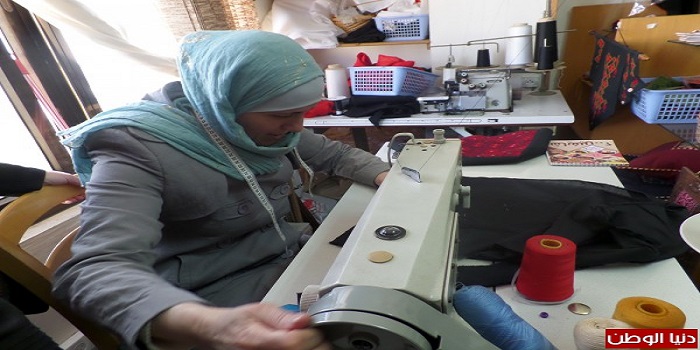Decline in Textile Industry Negatively Affects Women

Translated by Tamara Barakat
The decline of the textile industry in Tulkarem left its toll on the female labor force, as many of the women who were employed in this sector became unemployed.
According to the statistics published by the Ministry of Economy’s office in Tulkarem, in 2003, the number of industrial facilities that work in the textile and clothes industry decreased by 3.57%, the number of people employed by these facilities decreased by 9.35%, and the production of the textile industry decreased by 1.41%.
The closing of many sewing workshops in Tulkarem negatively impacted women. Currently, there are around 85 sewing workshops and each employs no more than 15 women who have been working in this industry for the past 10-23 years. The sewing industry is no longer able to employ new women, and rather relies on those who already have enough expertise.
Many of the women employed in this industry said that the difficult economic conditions of their families pushed them to seek employment in this industry, although some of them hold a university degree.
The harsh economic conditions and the lack of job opportunities forced them to work in this industry and accept the low wages they receive either on daily, weekly, or monthly basis, which do not exceed 1500 – 2000 shekels. Some women are even paid wages that fall below the minimum wage (1450 shekels).
The Government’s minimum wage law targeted such employees and others marginalized groups in the labor force whose wages sometimes do not exceed 800 shekels per month.
Some of the women who have been employed for many years in the textile industry mentioned that many of their fellow colleagues who lost their jobs either became unemployed or had to seek employment at doctors’ clinics, law offices, or clothing stores, and they work in conditions that are no less difficult than those of the textile industry.
The head of the Clothing Industry Employers’ Association in Tulkarem, Ali Awad, has been working in this industry since 1983. He started as an employee at one if his sister’s sewing workshops, and was able to open his own sewing workshop in 1992.
“When our sewing workshop opened, it employed around 70 women, but right now, it only employs 5 women whose expertise ranges between 10 to 23 years. Some of them are married, and some are not. They work for 8 hours per day and receive a daily wage of 50 – 80 shekels,” Awad said.
The chair of the Clothing and Textile Industry Employers Union in Tulkarem, Khaled Hassouneh, attributed the decline in the textile industry to the Israeli occupation and its blockade and closure policies, and to the large amounts of cheap Chinese products imported into the Palestinian market.
“The textile industry works for the benefit of the Israeli merchants and companies for around 6 – 7 months each year. The Israeli company or merchant provide the Palestinian workshops with the raw materials and the workshops produce the goods according to the Israeli demand. Then, the Israeli companies export these products abroad,” Hassouneh said.
Moreover, it is the Israeli merchant or company that determines the price of the produced pieces, rather than the Palestinian owner of the workshop. The workshops’ production rate for the local market does not exceed 1-2%.
Hassouneh also explained that the wages of the female workers at these workshops are determined according to their production and efficiency. It is impossible to give an employee who sews the produced pieces an equal pay to an employee who cleans the pieces after they are produced. He stressed that owners of workshops must abide by the minimum wage law, despite the taxes accumulating on them and the financial obligations they have to meet.
He said that the employees are more aware of their rights under the law, and many of them file lawsuits against their employers due to arbitrary employment termination or to receive their entitlements.
The head of the Palestinian Federation of Trade Unions, Mohammad Bleidi, believes that employers exploit the high rate of unemployment among men and women and employ them in their workshops without any written job contracts. Some even make the employees sign on empty documents that are used to deny them their rights in the future.
Bleidi said that female employees are not paid the minimum wage set by the Palestinian Labor Law. According to the law, the minimum wage is 1450 shekels for a person who works 7.5 hours per day, six days per week, and 26 days per month (including the official holidays). The female employees who are paid 40 – 50 shekels per day do not receive the minimum wage. Noting that according to the Palestinian Central Bureau of Statistics (PCBS) the minimum wage that amounts to 1450 shekels falls below the poverty line (1860 shekels).
Bleidi also said that workshop owners discriminate between men and women in terms of wages and salaries, and they prefer to hire more women because they accept lower wages.
(Huda Habayeb – WAFA)





